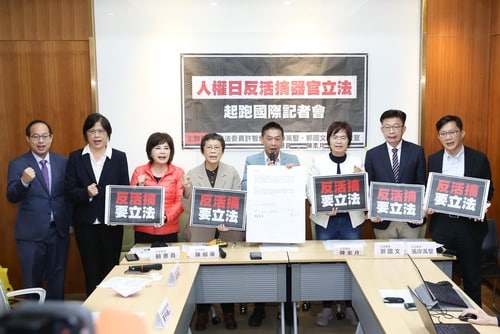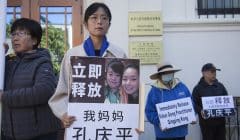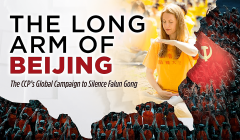With Global Support, Taiwan Legislators Propose New Criminal Law to Stop Organ Harvesting

Taiwan legislators Mr. Hsu Chih-chieh, Mr. Chang Liao Wan-Chien, Mr. Kuo Kuo-Wen, Ms. Chen Jiau-Hua, Ms. Lai Hui-Yuan, and Ms. Chen Su-Yueh held a press conference on December 9, 2022, a day before International Human Rights Day, calling for legislature aimed at stopping forced organ harvesting.
Update: As of December 14, 2023, the City Council of Kaohsiung, Taoyuan, Taipei, New Taipei and Tainan have passed resolutions supporting the legislation to end forced organ harvesting in China.
Legislators in Taiwan held a joint press conference on December 9, 2022 supporting proposed legislation to stop the Chinese Communist Party (CCP) from forcibly harvesting organs from prisoners of conscience in China. The bill seeks to punish perpetrators involved in forced organ harvesting and raise awareness within Taiwan about the issue.
Nearly 20 members of legislative bodies and human rights advocates from the United States, Europe, Japan, and South Korea sent videos to support the effort in stopping this crime against humanity.
The press conference was held by legislators Mr. Hsu Chih-chieh, Mr. Kuo Kuo-Wen, Mr. Chang Liao Wan-Chien, Ms. Lai Hui-Yuan, Ms. Chen Su-Yueh, Ms. Chen Jiau-Hua, and the Taiwan Association for International Care of Organ Transplants. So far, 26 legislators have shown their support for the proposed bill.
Stop Crimes Against Humanity
Mr. Hsu Chih-Chieh, one of the sponsors of the Bill of Combating and Preventing Forced Organ Harvesting, said that the entire world has spoken up against the atrocity of systematically harvesting organs from living people, and legislators from many countries look forward to seeing Taiwan push for the legislation to fight the crime against humanity. Taiwan should do its part to prevent live organ harvesting from happening, he said.
Co-sponsor Mr. Kuo Kuo-Wen said that he has heard about the CCP harvesting organs from living prisoners of conscience for at least ten years. Numerous people have been and continue to be killed for their organs. The issue did not get public attention until recently, when forced organ harvesting from Taiwanese people in Cambodia made the news. “I think we are late in the legislation to fight organ harvesting,” he said. He intended to expedite the legislation by working with other political parties and the administration to prioritize the bill.
Mr. Kuo agreed to make the “Universal Declaration on Combating and Preventing Forced Organ Harvesting” into law and criminalize any involvement in the pipeline. He said that the special legislation would list various forms of the crime and aggravate the punishment for it.
Mr. Chang Liao Wan-Chien said China’s hospitals continue to harvest organs from Falun Dafa practitioners against their will because of the CCP’s connivance. He also pointed out forced organ harvesting taking place in Cambodia as an example. He said if a civilized country does not take legal action to prevent organ harvesting on its own soil, such a heinous crime could spread to every country. He looks forward to connecting with the international community and enacting laws to stop the killing.
Ms. Lai Hui-Yuan agreed and said the international community should form an international legal network to work together and exchange information to end this crime against humanity.
The representatives from the Taiwan Association for International Care of Organ Transplants urged for the Bill of Combating and Preventing Live Organ Harvesting should be applied to the citizens of Taiwan, to people from mainland China and from abroad. The representatives also specified there should be no statute of limitations for prosecuting offenders.
Support from Political Dignitaries
David Patrick Paul Alton, member of the UK House of Lords, sent a video to show his support. He said that CCP-sanctioned, large-scale forced organ harvesting has been taking place in China for many years. Falun Dafa practitioners have possibly been the main source of organs. Uyghurs, Tibetans, and house Christians have also been victims of forced organ harvesting in China.
Lord Alton said that in the British Parliament, both the House of Lords and the House of Commons, regardless of their political views, support the legislation to punish the perpetrators of such a heinous crime.
Hermann Tertsch, member of the European Parliament said that the CCP has committed many heinous crimes, the worst among them being harvesting organs from living people and making lucrative profits from the systematic organ transplant killing.
Tertsch said that the world must prosecute this terrible crime, hunt down the perpetrators, and condemn every regime that condones or encourages the crime. The European Parliament has twice passed resolutions calling for the end of forced organ harvesting.
Jennifer Johnson, president of the Academy of Forensic Nursing, said that she supported the “Universal Declaration on Combating and Preventing Forced Organ Harvesting,” because killing vulnerable prisoners of conscience and harvesting and selling their organs is a serious and intolerable violation of basic human rights.
Alliance with South Korea and Japan
Cho Kyoung-tae, member of South Korean National Assembly, said forced organ harvesting remains a rampant problem. Everyone should expose the crime and work together to find solutions. South Korea previously enacted criminal legislation against organ harvesting, so Cho is willing to help Taiwanese legislators enact similar legislation.
Hiroaki Maruyama, Zushi City Councilor in Kanagawa, Japan said that the CCP’s systemic forced organ harvesting is the worst crime in history and should not be tolerated. He felt happy to see many legislators in Taiwan support the “Universal Declaration on Combating and Preventing Forced Organ Harvesting,” and extended his blessings.
Passed Resolutions
On December 11, 2012, the Legislative Yuan unanimously passed a resolution urging the Taiwan government to assist in the rescue of prisoners of conscience in China, who are incarcerated in labor camps, prisons, or detention centers by the Chinese regime due to political and religious beliefs and should enact laws and regulations to rescue them. The resolution explicitly pointed out that Falun Gong practitioners and Tibetans are among the prisoners of conscience who are subjected to most serious persecution. It also cited the atrocity of organs harvested from prisoners of conscience for profit in China in the human rights report submitted by Professor Manfred Nowak, Rapporteur on Torture and Other Cruel, Inhuman or Degrading Treatment or Punishment.
In addition, the 2011 annual human rights report published by the U.S. State Department and the 2012 annual report released by U.S. Congressional-Executive Commission on China (CECC) also stated the appalling atrocities of the practice of forced organ harvesting from living inmates on death row and prisoners of conscience for organ transplants in China.
In 2012, U.S. Congress and the European Parliament respectively held hearings on the atrocities of organ harvesting in China. Several prominent legal and medical expert witnesses testified in the hearings.
Based on original report published in Minghui.org.






